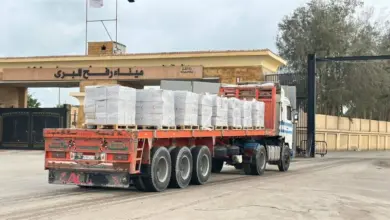GAZA CITY, Gaza – After marking its inaugural opening on Tuesday, the three-story mall in Gaza City now offers products running the gamut. The supermarket has nearly all possible commodities. Shoe stores with popular brand names, such as Nike, Adidas and Fox, sit next to clothing shops displaying window mannequins with hot miniskirts and vibrantly colored t-shirts.
On the Andaluseyya mall’s top floor, customers are able to enjoy quality time with their families, eating at restaurants, playing arcade games and, for the first time in Gaza, watching a movie in the cinema. Escalators, rare sites in this besieged coastal enclave, escort people between floors. To top it off, air conditioning provides much-needed respite from the oppressive heat outside.
In addition to recent construction that paved the way for this mall to open, Gaza City is in the process of opening several sea-side resorts. After three years with limited to non-existent commercial building, construction firms are now breaking stereotypical images of Gaza as a destitute territory with conditions comparable to the most-devastated sub-Saharan regions.
One of the primary investors in the mall, Ihab Al-Esawy, says the opening could never have been achieved if the current situation in Gaza was similar to years past. He needed previously-absent construction materials, now available, at his disposal.
After international condemnation was leveled at Israel following the May 2010 attack on a Turkish flotilla seeking to break the siege, Israel eased restrictions on regular commodities entering Gaza while maintaining prohibitions against the importation of materials that could be used for weapons manufacture. And, in the past few months since deposed Egyptian President Hosni Mubarak’s ouster, lax security measures in Sinai are enabling smugglers to operate freely. Without the need for basic food stuffs in Gaza, tunnel-workers are transporting construction materials in mass quantities.
“We put the [mall] plan of the project in on October 10th, 2010 and started the work immediately,” al-Esawy says. “We wanted to make sure that we had enough construction material though so we could start building.”
Since Hamas forcibly seized Gaza in 2007 following a parliamentary victory the previous year, the region has suffered from a severe blockade. In response to Palestinians casting ballot in favor of the Islamist group, Israel, aided by the US and the Mubarak regime, effectively isolated Gaza from the outside world. Palestinian residents there can not freely export or import goods or travel outside the territory.
Mohammed al-Qassas, a smuggler along the border, says it has been nearly seven months since he started transporting cement and stones. Previously, he says, there was a priority order to smuggled goods. The dire need for basic necessities, however, just doesn’t exist in the way it formerly did.
“In our work, we have priorities,” Qassas says. “Children milk and flour is definitely more important than a cement block and glass.”
As the mall opening and resort construction suggest, Gaza is experiencing a building boom that signals a sharp reversal from previous years. Cement factory owner, Hussam al-Nabeeh, told Al-Masry Al-Youm he resumed work three months ago after three years of unemployment. He says he’s now able to acquire gravel from the tunnels, a commodity he wasn’t able to obtain several months ago.
“Since 2007, I haven’t made a single [cement] block. Three months ago I only did some poor work recycling the rubble of buildings destroyed during the Israeli military offensive on Gaza in 2008-2009,” says Nabeeh. “[Now] I get loads of orders. I have to apologize to people sometimes because I have too many orders.”
Hamas’ Minister of Economy Dr. Alaa Rafaty says that despite attempts by Israelis and others to suppress the Gazan population, Palestinians in the territory just want to live normally, given the opportunity.
“Gaza is an exceptional case as it’s the only territory around the world that’s totally controlled by occupation,” Rafaty says. “Despite its lifelessness, Gaza seems to have a life by the effort of its people. We can simply say the Gazans managed to defeat the siege imposed on them.”
But life in Gaza remains below the standards of many countries globally. With the visible improvements in Gaza, however, Israeli media and others argue humanitarian assistance is no longer needed in the enclave. The Gisha Movement, an Israeli rights organization, calls for a policy change towards goods transfer in place of confrontation.
"Gaza doesn't need any more humanitarian aid. There is only one way to allow Gaza residents long term economic development while maintaining Israel's legitimate security needs and that is a removal of the sweeping limitations on transfer of goods subject to individual security checks," said Gisha Director Sari Bashi.
Mall investor Ihab al-Esawy, in accordance with such calls, said the tunnels can only provide the territory certain goods. He was unable to obtain glass doors because they could not be smuggled through. Acquiring important items for his mall from Israel, moreover, remains difficult despite the admissibility of the products.
“I faced too many hardships,” says Esawy. “I had to wait seven months for the escalator until it was allowed into Gaza through Israel and I had to pay extra taxes.”




